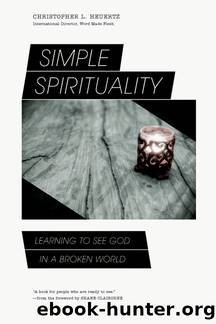Simple Spirituality by Christopher L. Heuertz

Author:Christopher L. Heuertz [Heuertz, Christopher L.]
Language: eng
Format: epub
Publisher: InterVarsity Press
Published: 2009-08-20T00:00:00+00:00
Simplicity in its essence demands neither a vow of poverty nor a life of rural homesteading. As an ethic of self-conscious material moderation, it can be practiced in cities and suburbs, townhouses and condominiums. It requires neither a log cabin nor a hairshirt but a deliberate ordering of priorities so as to distinguish between the necessary and superfluous, useful and wasteful, beautiful and vulgar.[14]
All of these are good questions, and Shiâs conclusions are pacifying observations, but most of the questions, and most of the typical answers, are about what we have, want, or need. I wonder if the questions shouldnât be more about what others donât have, still want and desperately need.
But these sorts of questions often make us feel bad. Then weâre at risk of being motivated to figure out a simplicity that is actually narcissistic. Iâve always appreciated Richard Fosterâs staple read on the topic, Freedom of Simplicity, especially the warning about our tendency to turn simplicity against itself. He writes, âMost dangerous of all is our tendency to turn any expressions of simplicity into a new legalism.â[15] Well, now Iâm in big trouble. Simplicity for simplicityâs sake is really only legalismâthat tyrannical feast of appearances where we put on airs to impress one another. David Chronic writes, âAttaching to Jesus leads to detaching from the world and to simplicity of lifestyle. This is not simplicity for the sake of simplicity, but simplicity for the sake of relationshipârelationship with God and relationship with each other.â[16]
When we embrace simplicity for simplicityâs sake, we wind up smelling foul, inauthentic. The spirit of true simplicity, however, is redemptive. We see Jesus laying down his life. We see Jesus celebrating the One who gives everything. We see Jesus forgoing nonvalues as he embraces the true values of the kingdom of God.
This is what the prophet Isaiah was pointing to in his writings on the aspects of true fasting (Isaiah 58). Isaiah suggests that fasting isnât simply to go without food, but to take that food and feed the hungry with it. True fasting is meant to create an openness and emptiness in us to allow those on the margins to have their needs met and fulfilled, to clothe the naked and offer a place for the wanderer to stay.
Growing up, I really messed up fasting. I used to think of it as a way to manipulate God, sort of like putting God in a wrestling submission hold (not unlike a spiritual half-nelson-chicken-wing or a figure-four-leg-lock). I wanted fasting to make God do something for meâI wanted it to force God to answer my prayers. If I donât eat, then âGod, you better hear my prayers, and you better answer them! Just look at me, so pathetic and miserable in my hunger.â Fasting became the puppet strings fastened to Godâs arms and legs, and my going without food was supposed to give me the power to pull on those strings.
Isaiah deconstructs that paradigm and reconstructs one built around justice. The prophet shows us
Download
This site does not store any files on its server. We only index and link to content provided by other sites. Please contact the content providers to delete copyright contents if any and email us, we'll remove relevant links or contents immediately.
The 5 Love Languages: The Secret to Love That Lasts by Gary Chapman(8493)
The Space Between by Michelle L. Teichman(6086)
Assassin’s Fate by Robin Hobb(5236)
Wiseguy by Nicholas Pileggi(4585)
Everything Happens for a Reason by Kate Bowler(4067)
Gerald's Game by Stephen King(3918)
A Simplified Life by Emily Ley(3567)
The Power of Positive Thinking by Norman Vincent Peale(3447)
Pillow Thoughts by Courtney Peppernell(3394)
Resisting Happiness by Matthew Kelly(2886)
Girl, Wash Your Face by Rachel Hollis(2820)
Being Aware of Being Aware by Rupert Spira(2706)
Name Book, The: Over 10,000 Names--Their Meanings, Origins, and Spiritual Significance by Astoria Dorothy(2490)
Real Sex by Lauren F. Winner(2474)
More Language of Letting Go: 366 New Daily Meditations by Melody Beattie(2442)
The Holy Spirit by Billy Graham(2414)
Fast Facts on Defending Your Faith by John Ankerberg & John Weldon(2387)
Victory over the Darkness by Neil T. Anderson(2385)
The Secret Power of Speaking God's Word by Joyce Meyer(2252)
